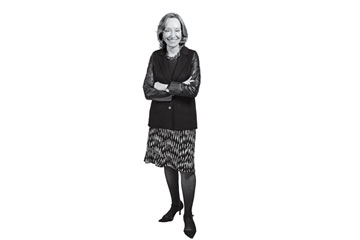
Your book The Bully Pulpit is about two U.S. Presidents. I understand writing a book about Theodore Roosevelt. But William Howard Taft?
Taft was Roosevelt's handpicked successor. I didn't know how deep the friendship was between the two men until I read their almost 400 letters, stretching back to their early 30s. It made me realize the heartbreak when they ruptured was much more than a political division.
Do female historians look at history through a different lens than male ones?
I know that relationship is the thing that interests me, because I think it gets at the inner person behind the public figure.
Are we now in a similar time to Roosevelt's?
A main concern in his time was that business enterprises had merged, an enormous gap had developed between the rich and the poor, and part of that was because of the Industrial Revolution, like the technological revolution we've had now. And there was also division in the Republican Party, although I didn't foresee the Tea Party when I started the book seven years ago.
Is President Obama using the bully pulpit effectively?
Roosevelt coined the phrase bully pulpit for the platform that a President has to influence public sentiment. I think after Sandy Hook, when Obama went out and he talked a lot about gun control and he met with the parents, there was a sense that something was going to happen. But then, I guess, the power of the special interests was greater than public sentiment.
Your son ran for state senate in Massachusetts, right?
He did. He came in second and only a couple hundred votes behind, so it was an incredible experience. He loved it.
You've sold the film option for this book, as you did with your Lincoln book, to some guy called Steven Spielberg. Do you have any casting ideas?
The person who plays Taft is going to have to be considerably larger than the person who plays Teddy. And the person who plays Teddy has to have enormous energy, crazy gestures and a voice that goes from bass to falsetto.
New accounts of JFK's philandering keep emerging. Does he get a pass for his failings because he was killed?
If we discovered them at the time, it would have been huge. Maybe the reason people shrug it off is they've filtered it already into their opinion of him. It does seem like an enormous risk he took with the presidency and almost an obsession for him. But there's still a public fascination for him despite these stories' having dimmed it.
Taft was a big guy, 350 lb. [158 kg] or so. In the current era, do you think weight is more of a liability for a potential leader?
It probably is. There was one picture of Taft sideways, but today you see all the dimensions often. Even more important, obesity, we know now, is troublesome for health. I think people would be concerned about that in a way that they weren't in Taft's time.
So is anybody Taft-shaped who might be thinking of running for President doomed?
It depends on how the person handles it. Obviously Chris Christie had surgery done. That means at least he is taking steps to help his situation. And he's so able to parry that if somebody tried to use it in a debate, you can picture him getting the better of the person.
Your favorite team, the Boston Red Sox, just won the World Series by not shaving. Do you have any superstitions when watching them play?
The worst part of my irrational passion is that I don't even see half the game. I get too nervous. If I'm at home and there's some guy on base for the other team, I turn it off and come back a few minutes later hoping there was a double play. At [Fenway] Park, I'm better. When it gets really nervous-making, I'll go to the bathroom.
